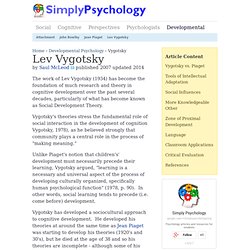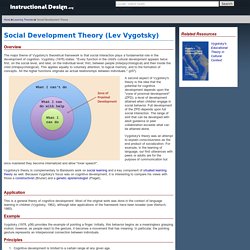

Constructivism - Learning and Teaching. Constructivism is a learning theory found in psychology which explains how people might acquire knowledge and learn.

It therefore has direct application to education. The theory suggests that humans construct knowledge and meaning from their experiences. Constructivism is not a specific pedagogy. Piaget's theory of Constructivist learning has had wide ranging impact on learning theories and teaching methods in education and is an underlying theme of many education reform movements. Research support for constructivist teaching techniques has been mixed, with some research supporting these techniques and other research contradicting those results. Resources What is constructivism? Concept to Classroom > Constructivism as a Paradigm for Teaching and LearningProvides a workshop on the concept of constructivism beginning with an explanation of the term and ending with a demonstration of how the concept can be applied in the classroom.
Concept to Classroom. Examples & case studies. Cognitive Constructivist Theory. For a general intro to constructivism click: Overview of constructivism.

Overview of Cognitive Constructivism Cognitive constructivism is based on the work of Swiss developmental psychologist Jean Piaget. Piaget's theory has two major parts: an "ages and stages" ( component that predicts what children can and cannot understand at different ages, and a theory of development that describes how children develop cognitive abilities. It is the theory of development that will be the focus here because it is the major foundation for cognitive constructivist approaches to teaching and learning. Piaget's theory of cognitive development proposes that humans cannot be "given" information which they immediately understand and use. There are thousands of books, articles, and papers on the theories of Piaget and the implications of those theories for teaching and learning. Vygotsky. The work of Lev Vygotsky (1934) has become the foundation of much research and theory in cognitive development over the past several decades, particularly of what has become known as Social Development Theory.

Vygotsky's theories stress the fundamental role of social interaction in the development of cognition Vygotsky, 1978), as he believed strongly that community plays a central role in the process of "making meaning. " Unlike Piaget's notion that children's' development must necessarily precede their learning, Vygotsky argued, "learning is a necessary and universal aspect of the process of developing culturally organized, specifically human psychological function" (1978, p. 90). In other words, social learning tends to precede (i.e. come before) development. Vygotsky has developed a sociocultural approach to cognitive development.
No single principle (such as Piaget's equilibration) can account for development. Vygotsky\'s Theory of Cognitive Development. Vygotskian Approach - Tools of the Mind. Lev Vygotsky Dr.

Lev Vygotsky The concept of “tools of the mind” comes from the work of Russian psychologist Lev Vygotsky. He believed that just as physical tools extend our physical abilities, mental tools extend our mental abilities, enabling us to solve problems and create solutions in the modern world. When applied to children, this means that to successfully function in school and beyond, children need to learn more than a set of facts and skills. According to Vygotsky, until children learn to use mental tools, their learning is largely controlled by the environment; they attend only to the things that are brightest or loudest, and they can remember something only if has been repeated many times. One of Vygotsky’s contemporaries, psychologist Kurt Lewin, was known to have said, “There is nothing more practical than a good theory.”
With his colleagues and students, Vygotsky developed multiple applications of his theory to general and special education. Social Development Theory. Overview The major theme of Vygotsky's theoretical framework is that social interaction plays a fundamental role in the development of cognition.

Vygotsky (1978) states: "Every function in the child's cultural development appears twice: first, on the social level, and later, on the individual level; first, between people (interpsychological) and then inside the child (intrapsychological). This applies equally to voluntary attention, to logical memory, and to the formation of concepts. All the higher functions originate as actual relationships between individuals. " (p57). A second aspect of Vygotsky's theory is the idea that the potential for cognitive development depends upon the "zone of proximal development" (ZPD): a level of development attained when children engage in social behavior.
Vygotsky's theory was an attempt to explain consciousness as the end product of socialization. Application.